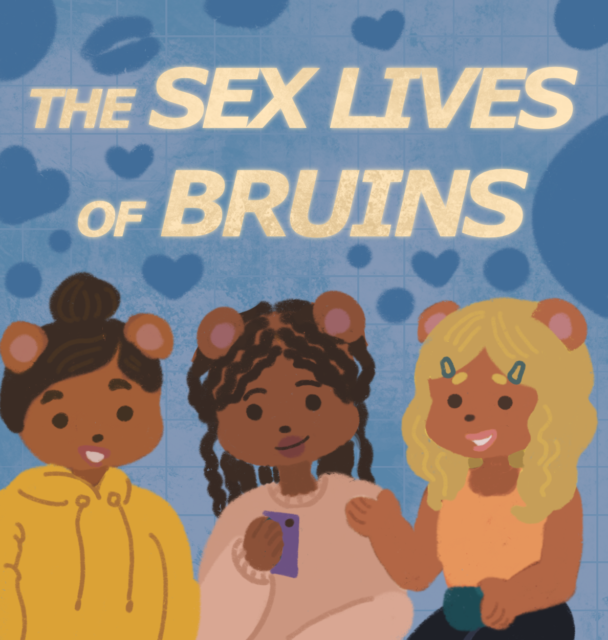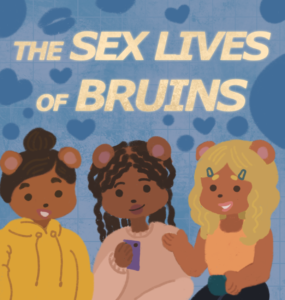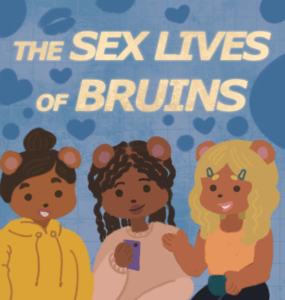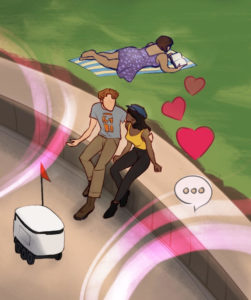In this episode of “The Sex Lives of Bruins,” a Daily Bruin podcast about sex and relationships at UCLA, Podcasts contributors Phoebe Brous and Kaitlyn Esperon talk to Elise about her experience being in a sorority and abstaining from casual sex.
Kaitlyn Esperon: Hey y’all and welcome to The Sex Lives of Bruins. I’m Kaitlyn, a Podcasts contributor for the Daily Bruin. This series explores how sex and relationships in college impact our growth and understanding of self. We talk to a whole host of Bruins on different issues. But most importantly, we’re trying to understand how we can better advocate for ourselves, especially as it relates to safe sex, consent and communication. Today I’m with my friend Elise. We talk about being sex positive while choosing abstinence, and also how being in a sorority impacts sex and relationship dynamics. Hope you enjoy.
KE: Okay, would you like to introduce yourself?
Elise: Yes. Hi, I’m Elise, I’m a junior.
KE: How do you personally view sex?
E: I view sex as enjoyable, I would say it’s something that I want to do. But my perception has definitely shifted over time from basically wanting to have sex with anyone to now feeling a certain level of seriousness with choosing who I have sex with. Just because of my past experiences and feeling like I’m almost disrespecting myself if I choose someone that is not necessarily worthy of me having sex with if that makes sense.
KE: Have there been specific instances that made you not want to continue life in this way?
E: Yeah, I can just get into sharing about my ex-situationship, which I feel, shifted my perception of sex a lot. So I was seeing this guy in high school. And I was so obsessed with him, it’s embarrassing. But basically, we just had sex and then he would talk to me after but I’m sure he didn’t want to. And I came to college. And I was just still so obsessed with him and started just having sex with so many random people. And I would see him on breaks. And it went on for like a year of just us talking and seeing each other, but then also me being in college and having sex with other random people. And then I remember he came to visit LA, sophomore year, and we hooked up. At this point, I knew it was an extremely toxic relationship. But I still hooked up with him, and I was really embarrassed about it and upset with myself. A week later was my birthday, and he didn’t text me and I don’t know why it just set me off. I don’t know, I really just put myself out there for him, like kept going back to me even though he was so toxic. And he didn’t even text me for my birthday. And at that point, I was sort of like, “I’m not having sex with people who don’t respect me anymore.” And since then I haven’t had any more one-night stands. I have been very selective with who I’ve had sex with. And yeah, that sort of was the tipping point for me.
KE: Do you think there’s something about UCLA sex culture that makes casual sex feel disrespectful?
E: Not necessarily like the inherent act of sex is disrespectful. But I would say there’s a certain level of people wanting to have sex for validation. People talk about this a lot with male validation. But I think it’s certainly a thing among my female friends as well, of almost feeling like a certain level of clout for having had sex with different people. And I remember when I was sort of in my hoe phase, I would love to tell my friends about it. Like, yeah, I had sex with this guy in this frat and I don’t know, it almost like, just made me feel cooler in a way. And I know that’s something people talk about with guys like they have sex for male validation. But it’s certainly a thing for women too and I think that makes the act of sex more transactional. Yeah, but I don’t know about disrespectful, I would say, that’s very individual.
Phoebe Brous: What’s interesting is the clout thing, but also something that I’ve experienced, and I don’t know if you relate to this, is the subtle slut shaming that a lot of women do with each other when you’re going through a hoe phase, or engage in casual sex. Is that something that you relate to in your friend groups? Or do people feel pretty supportive and sex positive?
E: I would say people in my circles are very sex positive. I think UCLA is a huge school, so people probably have different experiences depending on their different circles that they interact with. But I would say there is a certain level of sex being viewed as a positive thing and you’re cooler if you’ve had more sex with more people. At least, that’s how I have felt. But then I also think people who shame others for having sex might be doing it out of insecurity in themselves in their own past sexual partners.
KE: Have you ever felt pressured to participate in sex culture?
E: Yes, I had a very toxic friend in high school. She had a lot of sex at a very young age, and I think that was rooted in a lot of insecurities, but she sort of wanted to involve our entire friend group in sex culture. And I remember there was this guy who was sort of in our friend group, and she would always tell me like, “Elise, you should hook up with him” like “you should give him head.” I was 16. I was like, I didn’t want to have sex this random guy. I didn’t think he was a good person. But I remember he snapped me one day when we were at school. And she saw that he snapped me and she was like, “Elise, you have to go over to his place.” I don’t know, it was very uncomfortable for me, but I didn’t really succumb to her pressure, but one of my best friends did and lost her virginity to one of the guys in this friend group. And I know that she really regretted it. And yeah, that was an extremely toxic experience. I haven’t had any experiences like that at UCLA, though. I feel like most of my friends are very much do whatever you’re comfortable with, especially my genuine ones.
KE: I know, you mentioned that your opinions about sex have changed a lot from high school to college. Have your opinions about romantic relationships changed as well?
E: Yes, I think I now value my independence a lot more than I used to. I think growing up in films and TV shows, I really wanted just like a super passionate love and where you’re obsessed with one another and all consumed. Not having that has forced me into being more independent. I didn’t date anyone in high school or college. And I just developed things about myself that I really liked, and I developed extremely strong friendships and interests and just feel so much more grounded now in myself, that the idea of having a romantic relationship and inviting someone into that space of my own life is a lot less appealing. So I’m obviously open to romantic relationships, but I view them a lot different. I view them as a partnership rather than a mutual obsession.
PB: I like what you said about the mutual obsession thing. I feel like in high school relationships, especially early relationships, aren’t healthy. It’s like expectations to text 24/7, hang out a lot, hold hands. It’s more performative than now. And let me know if you agree with this, but I feel like college relationships are more mature when there’s a valuing of independence and space.
E: I definitely agree with that. But I also have seen a lot of toxic college relationships. I think that growing up, I thought that college students are more mature than they actually are. I see my friends get into really unhealthy relationships. Due to that mutual obsession thing.
KE: What do you think characterizes an unhealthy relationship?
E: I think an unhealthy relationship is when you feel a sense of responsibility for the other person’s happiness. And I think to be in a truly healthy relationship, you need to be so secure in your own sense of self. You’re not in the relationship for validation, you’re in it because you genuinely love and care about someone. It’s not like a transaction or you’re getting anything from them. It’s purely just out of love.
PB: How do you define a situationship?
E: A situationship is a repeated sexual encounter. I think it can range. Some situation-ships don’t really have feelings, I would argue most of them do. Most people aren’t trying to have sex repeatedly with someone that they’re not at least a little bit interested in as a person. And I think there’s a level of discomfort to a situationship of not really knowing where you stand. And yeah, not having those honest conversations that make something into a potential relationship.
KE: Do you think situationships can exist without discomfort?
E: Not for me, I would say. Maybe someone is super detached from their emotions when they’re having sex, but I am certainly not like that, and it took me a while to learn that. I always thought I could do a friends-with-benefits type of situation. But yeah, I don’t think it’s possible. I think sex is inherently, for me, so emotional.
KE: Can you explain that a little bit?
E: Yeah, I’m, I could try. I think it’s very biological, just in the hormones that are released from having sex. But at least for me, I started wanting to have sex because I wanted validation and I wanted it to bring me confidence and make me think someone thought I was hot. Once you get that, it’s then hard for the person who made you feel that way to then ghost you or stop talking to you, and it sort of removes all the validation that you got from the initial sex with that person. Even if I wasn’t in love with the person I was having sex with, it still hurts when they stop wanting to hook up with you, or stop texting you, or are just inconsistent.
KE: In your ideal world would sex exist without validation?
E: Well, no, because I do think that the validation from having sex is really nice. And that’s like something I love when having sex is like, if the guy is like, “Oh, like you’re so pretty,” or whatever, you know, just like makes you feel good. I think masturbation exists to fill that void of getting the sexual pleasure without any of the other emotional factors.
KE: How important do you think the human connection aspect of sex is? Of knowing who your partner is?
E: Now, I think it’s very important. I think my younger self wouldn’t. I think for me, when I’m having sex, I need to feel respected. And I need to feel like the other person sees me as a person with feelings. Like, I don’t want to be slammed around. I know some people are into that.
PB: Thoughts on dating apps; have you been on dating apps?
E: Yeah, I have. Freshman year, towards the end of freshman year, I met a guy on Bumble. And we went out like 10 times, but he was very sweet, and yeah, a lovely person, but it just like wasn’t meant to be. Honestly, I think dating apps are awesome. It’s like, just because our generation is so awkward, I feel like, when it comes to dating, it’s nice to sort of have that ability to meet someone without having to really put yourself out there. Maybe it’s not good for us in the long-term. But in the short-term, it’s super convenient. Yeah, so I’m back on the apps now. I’m not looking for a boyfriend, but I think it’s fun. And I think I’m now looking for someone that will give me butterflies, just make me excited.
KE: How has being on dating apps and trying to talk to guys at parties affected your self-esteem?
E: Okay, so sort of, after I had that, after I wrote my ex off, basically, or my ex-situationship, I had a really long period of not seeking out sex, or seeking out men at all. And that was some of the best times of my life, honestly, going to parties and just being with my friends and meeting new friends, and really securing who I was, and getting super into my hobbies. And, you know, doing the crossword, like, I don’t know. That was a – it was a really great time. It is, I’m still sort of in that. It is a really great feeling. And I would say going to a party and not looking around for a potential hookup makes the party so much more fun. Because when you are looking for a guy, I feel like you’re not really dancing, you’re trying to look cool. Then you’ll get sad if you see him talking to someone else, you know, it’s just not a good feeling. And I don’t plan on ever going to a party and looking for a guy to hook up with ever again, because it is so horrible. And it is so much more fun to just dance. Also, when I was not looking for guys at all, my self-esteem was very high because I was not facing any rejection whatsoever. And I was just like, yeah, not having sex, but that’s my choice. And it just felt amazing, honestly, would recommend.
KE: Do you think belonging to a sorority has significantly impacted the sex culture that surrounds you?
E: Yes, in the sense of like, a heightened interaction with frats and knowledge about frats. And I think there’s an inherent sense of, “oh, you’re going to a date party, you want to pick someone who you might have sex with?” Or “oh, like, we’re going to this raid, let’s try and get laid. Let’s try and make out with someone.” There’s a certain sense of that, even if it’s not explicitly said, I think it makes going out almost less fun. Because it’s like, you’re with your group of friends, but everyone’s sort of keeping their eyes out on the crowd, looking for a hot guy to talk to and go home with.
PB: Could you talk more about date party politics? What is a date party? What does it mean to invite someone? And then how does it work, for folks that don’t know what that is.
E: Okay, so a date party is a sorority event and frats have them too. But in my experience, I’ve only been to sorority ones. The sorority pays for it, and everyone can invite one person. I think when you’re choosing who to invite, you’re either going into it with the mentality of “oh, there’s no one I want to have sex with. I’m going to invite a friend.” And when people do that, they make it extremely clear, like “we’re just going as friends”, whether that’s a guy or a girl that they bring, at least in my experience. There’s no one who invites someone genuinely with no expectation of either no plan of whether they’re going to have sex with them or not. You either know you’re not or you know you want to, basically.
PB: And both people think about that too. They consider it.
E: Yeah. And even if people say like, “oh, I don’t know, whatever happens”, that means that you probably want to go home with them. Or not necessarily have sex, but like hook up with. A setup is basically, you don’t have anyone you personally want to bring. But you also don’t just want to bring a friend, you want to sort of have some excitement, have some surprise to your date party experience. I’ve been set up before; one of my friends just knew a guy that wanted to go to a sorority date party, which I think is what typically happens. And then obviously, we probably looked at each other’s Instagrams and decided if we want to go with each other. It’s really weird, honestly, it’s such a weird concept of meeting a stranger and then deciding during that night if you’re going to hook up with them or not.
PB: Do you think there’s a distinction between the sex culture in sororities versus frats? Or do you view it as the same?
E: Yeah, I mean, just well, the fact that a frat formal is a sleepover is a pretty clear indication and distinction, in my opinion. So for frat formals, you’ll go – I think some people go to like Newport Beach, or Palm Springs or something – and you share a hotel room with your date, and with another pair, essentially, which is really weird. I don’t think I would ever want to do that, personally, especially if it was a setup. One of our friends went on a date party that was a setup, and I think it was a super uncomfortable experience for her. Because maybe you do just want to go and go to this fun party; it’s a free trip. And then you’re sleeping next to the guy who invited you, who obviously wants to hook up with you. Yeah, it’s super weird. For sororities, it’s way more common to invite your friend to a date party. And I think that’s partially sororities are just, they’ve embraced a much more progressive approach, at least at UCLA, I feel like they really emphasize consent and making everyone comfortable and supporting women, at least in my experience. And so I feel like that’s sort of the difference of why it’s more acceptable to take a friend, I think. If a frat guy took another frat guy, that would be much more looked down upon. But that also has a lot to do with homophobia, as well.
KE: Have you ever felt there was a heightened expectation for sex at these events versus non-affiliated parties?
E: Yes, I would say there is a certain sense, especially for going to a raid.
PB: What’s a raid?
E: A raid is an event between one frat and one sorority. And I think the entire, like when the sorority is planning the raid, they’re really looking for frats that have hot guys and have guys that, you know, we would want to get with or talk to. So I think there is that sense going into it, of like, this is a great opportunity to meet someone at a frat. But at the same time, I think fraternity men are super awkward. And sometimes, there will be a little bit of a gender segregation at them. And it’s so weird. It’s like, it’s the whole point of going to it is to meet guys, then why did they not talk to us? And why don’t we talk to them? It’s really weird, actually.
KE: Do you think the expectation is different for sorority members going into the parties versus fraternity members going into the parties?
E: Yes, I think that frat guys, I think they look at these events as ways to hook up with girls. Whereas we look at them more of like, “Oh, this is a fun theme. Like I’m excited to get ready with my friends. I’m excited to party with my friends.” I don’t think guys feel that way. I don’t know exactly what they think. But that’s my perception. But I think we’ve also might notice, like less frat guys going to it if they like don’t want to hook up with girls in our sorority, whereas we kind of care less about which frat it’s with, and more about, you know, if it lines up with our class schedule.
PB: So if frat guys are coming under the pretense of “I’m looking for a girl to have sex with,” how can there be mutual respect? Or is that possible? Does that exist?
E: I mean, I think in general, across society, we see men not respecting women that they don’t find attractive and don’t have sex with; whereas, I don’t think there is the same sense among women. I think we are open to platonic relationships with men in a way that most men aren’t. I mean, yeah, I don’t have a ton of nice things to say about fraternity men. I don’t, in general don’t think they are super respectful of women. And I think they judge sororities based on attractiveness and choose whether to go to the events based on that as well.
PB: In your sex culture and Greek Life sex culture, is there a large emphasis on safe sex? Like condoms, STD tests, testing, etc., etc.
E: I think in my friend groups, safe sex is very prioritized. Yeah, very important. And I think it sort of comes down to that, who you’re interacting with and what the culture of your community is like. In my experience, it’s been very emphasis on safe sex. But I don’t know what male friendships are like, I’m sure they talk about it less than we do, which sucks. Because in a lot of cases, like they’re the ones who need to, you know, wear the condom or get tested.
KE: Do you think it’s any different between men in Greek life or not in Greek life in the way that they approach sex?
E: I’m trying to think about who I’ve hooked up with that isn’t in Greek life.
KE: Because also from my personal experiences, it’s been the same.
PB: Oh low key, yeah. Which is probably a bad thing, right? Yeah. Because like the non-frat, indie boy.
KE: Yeah, people underestimate how much a frat boy an indie guy is.
PB: They’re the same. They’re the same.
E: So true. Same guy, different font, for real.
PB: It’s almost silly, because with those guys you expect they are different. Self-proclaimed feminists.
E: And I will say as much as I’ve generalized frat guys during this conversation, there have been many wonderful frat guys I’ve had sex with, who have been super into consent and being respectful. There have been some less respectful but luckily haven’t had any, you know, horror stories.
PB: If you had a little sister or daughter, what would you tell her about – what’s the biggest thing to know about sex/relationships?
E: I do have a little sister and I hate thinking about her having sex. I would say the most important thing is to just go with your instinct when it comes to sex. Because I think there is so much either societal pressure or peer pressure, or pressure from the media, to be having sex or to be not having sex, depending on you know, the culture that you’re in. But the only way you’re going to feel good about sex is if it’s just a conscious decision that you make from your gut and your vagina.
KE: The Sex Lives of Bruins is brought to you by the Daily Bruin, UCLA’s student newspaper. You can listen to the show and others by the Daily Bruin on Spotify, Apple podcasts and SoundCloud, and the transcript for this show is available at dailybruin.com. Thanks, everyone. See you next time.






Comments are closed.